I ran home throwing my bags on the floor, ripping off my jacket layers (it was hovering around freezing, which meant I had at least 3 jackets on).
‘Aaron!’
‘Yes, medium boo.’
‘You have to listen! Â I listened to one of your ultrarunning podcasts and….and…there was a coach who was SANE.’
Aaron turned me on to the ultrarunner podcast a couple months ago, and I’ve enjoyed listening to 4 or 5 of them so far.  It certainly has a west coast bent, and most of the people and races I’m not familiar with, but I did really enjoy the Brian Rusiecki interview, not only because he is an adorable person but also because he discusses things we’re all familiar with like ‘Horton Miles’, Escarpment, etc.  But there was one interview that struck a chord hard.
I had never heard of Jason Koop before listening to the podcast.  Apparently he coaches a lot of ultra runners, including some of the elites (e.g., Dakota Jones).  There was an interesting dynamic during the interview, because the person conducting the interview naturally was interested in extracting juicy coaching tips and the secrets to training.  But Jason spent much of the interview deflecting these questions, emphasizing that each runner is individual and there is no formula that is generalizable for all runners.  Jason emphasized that unlike some coaches who also are runners themselves or RDs or have a full-time job, Jason only does coaching, and treats it like a craft.  He tailors workouts and training structures to an individual athlete, based on all kinds of variables including how quickly they recover.
Aaron hadn’t heard of Jason Koop either, and I pointed out the podcast for him on the website.
‘God it’s so frustrating,’ I put my head in my hands on the table. Â I felt like I had found a unicorn.
When Aaron met me four years ago, my running was ‘unstructured’.  I didn’t own a watch.  And no, I don’t mean I didn’t own a GPS watch.  I mean I didn’t own any kind of device that could inform you of the time, except my cell phone.  I didn’t keep any log of miles.  To train for a marathon, I made sure I went out one Saturday a couple weeks before the race and did a ‘long run’.  I figured if I could run at least 18 miles on that day, I’d be set.  I could always squeeze out another 8 on marathon day.
Of course, I just waved my hands and guessed what 18 miles was back then.  Now with modern technology I have deduced that for my 2008 Marine Corp marathon my single ‘long run’ in Rock Creek Park was ~15 miles, for my 2010 Marine Corp my ‘long run’ around the Mall was ~14 miles, and for my 2009 Boston Marathon my long run was in a coffee plantation in Laos and probably wasn’t much more than 10 miles.  I probably ran 30-40 miles a week for regular training; less when I traveled.  But, I did sub-3 at all those marathons and figured I was the Queen of Marathon Training.
Aaron and I quickly came to discover that we had very divergent notions of ‘marathon training’.  In fact, he contended that my version could not by any stretch of the imagination be considered ‘training’.  And I had to agree with him.  ‘Training’ was in fact a dirty word.  For me, training meant Ned.  And Bob.  Old men trying to bend me to their will.  Aaron picked up on this very quickly and astutely averted any appearance that we might be ‘training’ for something.  If stopping to look at birds and mushrooms on our runs bothered him in any way, he disguised it very well.
I have a tendency to demonize my college track coach Ned.  From my perspective, he destroyed what could have been a fruitful collegiate career for me.  But as time goes on I try to be more balanced in my perspective. My teammates had a lot of respect for him: he had been a wunderkid 800 meter runner who came agonizingly close to qualifying for the Olympics (less than a second).  He was a very technically proficient coach and I liked the way he scheduled our training to sacrifice success at the beginning of the season but sharpen and peak by the end.  I also liked the way he had us do ‘blind’ workouts where he would only tell us one interval at a time what to run (i.e., run 800m at 2:45-2:48 pace).  The intention was to fight our natural inclination to run slower in the middle of the workout.  Definitely made us run harder.

Ned and I got along splendidly….for about two days.  I was in his good graces for the first workout of the 2001 cross country season.  New England is beautiful in the fall, and I ran the workout as hard as I could, finishing first among teammates in each of the three one-mile repeats through the meadows.  It was by far the hardest and longest workout I had ever done, and I was proud to have my first collegiate cross country workout in the bag.  But I was a spindly little runner, a mere ~115 lbs, who raced hard but never trained.  Despite being the Maryland state cross country champion in high school, a typical day of training was to run a warm-up lap around the track and trot 2.5-3 miles around the neighborhood.  The only reason I had any speed at all was because I played travel-team soccer fall-winter-spring.
So my legs had not been ready for that caliber of workout.  And two days later when it was time to do another workout, I suggested that I should just jog around and try to shake out the lactic acid.  Amherst’s first meet of the season was in two days, and I was afraid I’d be totally dead-legged.  Ned chafed.  To his credit, Ned had gone through his calendar and very carefully designed each and every team workout over those months with a mind towards an ultimate goal: Nationals in November.  I begrudgingly trotted at half-speed through the workout, which only incensed him more.  We argued: he contended that the team was in base-building period and that I was supposed to feel dead-legged in September; I couldn’t reconcile doing a speed workout with building a base.  From that day on, he thought I was a princess who thought she deserved special treatment, and I felt like he wasn’t on my team.  Everything we did was perceived through those filters, and we clashed time and again
The second xc meet of the season fell a few days after September 11, 2001.  I had felt dead-legged at our first meet and didn’t have a great race, but I was our team’s first finisher and we won the meet as a team.  Ned was satisfied.  But I had an intense reaction to 9/11.  I hadn’t lost any loved ones in the Towers. I didn’t have any personal tragedies.  But the night of 9/12 I slept for 20+ hours.  Through all my classes.  When I finally woke up I couldn’t tell if it was morning or evening.  For the next few days I had no energy, like a zombie.  I didn’t even try to run.  But it was decided to hold our Saturday meet, and I dressed in uniform and rode the bus.  But after warm-up I told Ned that I was in some kind of post-9/11 funk, a depression, and I was not in a mindset to race.  Ned was unconvinced.  Everyone else on the team was running.  None of my friends or family had been lost in the Towers.  I ran about a half mile of the race and dropped.  Ned scowled at me for the rest of the day.  He pointed at all my other teammates standing around who had run their guts out that day, despite whatever trauma they may have experienced.  I had let each of them down.
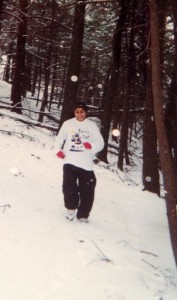
The xc team was kind of a cult.  Ned liked it that way.  Everyone ate and lived together.  At least three couples from the time I was there wound up getting married.  The fact that I had no interest in being part of the cult made me all the more troubling for Ned.  A lot of girls stayed on the team for purely social reasons — all their closest friends were teammates.  In the end it was all too easy for me to walk away.  I had friends from the soccer team, from the equestrian club, from classes.  My best friend on the xc team was Aparna, who now is a successful professional comedian (a year or so ago Aaron and I watched her perform standup at Sixth & I).  I liked running with her because she was dark and funny and didn’t stop her watch every time we stepped over a log.  After long runs on weekend we went out for big tasty brunches and stuffed ourselves silly.  And we made fun of Ned.  A lot.
Ned and I had a fundamentally different vision of the coach-runner relationship.  I wanted a two-way relationship, where I talked openly about my mental and physical state and we would design a personalized training regimen that played to my strengths and recognized my weaknesses.  Ned perceived any requests for deviations from his team-designed training plan as insurrection.  He once declared, ‘This is not the Martha show!’
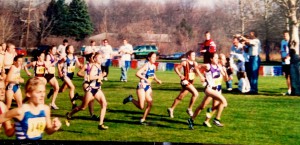
Ned suspended me for a critical month of xc training (late Sept to late Oct 2001), forbidding me from running with anyone else on the team, even on my own time.  But I came back at the tail end of the season and dropped a 17:44 5k to finish 19th at Nationals.  It hurt like hell, and after the race I lay in the van ill while my teammates did Iowa sightseeing adventures including the John Deere tractor museum.
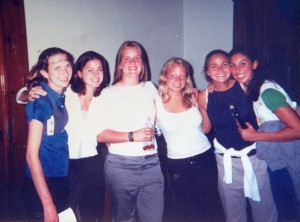
The next spring I studied abroad in Melbourne, Australia, with Katelyn, my friend from the Amherst soccer team, and never ran competitively again in college again.  Several times I visited Ned’s office to retrieve my framed All-America certificate.  Each time he held up his hands and said he misplaced it.  I wonder if he eventually threw it out, or if it still languishes at the bottom of his file cabinet somewhere.
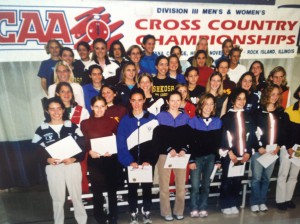
When my parents let me transfer after my freshman year of college from Stanford University in California to a small, liberal arts college in New England called Amherst College, they did so on the condition that I visit a therapist once I got to Amherst.  I was offended that my parents thought I’d lost the plot, so I wasn’t too keen on the idea.  But Patricia was awesome.  She quickly grasped why I had made the leap of faith to leave Stanford, and why I was likely to thrive in my new environs in Massachusetts.  Having settled the key issue rather quickly, we spent most of our time talking about Ned.  She recognized that Ned’s approach triggered the exact same reactions as my father had in high school, and that was part of why it made me shut down so quickly.  We also talked about how it came down to a power struggle. From Ned’s perspective, any compromise on his part would undercut his authority, and diminish him in the eyes of the entire team, whose respect he needed in order to be an effective coach.  From my perspective, I needed a coach who had some give in the reins.  I knew my body well, and there were going to be days where what was good for the team wasn’t going to be good for me.
My senior year, after several seasons of not running, I flirted with the idea of competing again.  I came to some practices, it was kind of awkward, but it was fun to be running on the team again.  But I saw flickers of our old runner-coach power struggle, and there got to be a point where I needed to know that things would be different between Ned and myself, just the slightest indication that he and I could speak to each other like adults and make reasonable compromises.
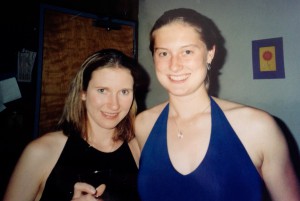
There was only one thing I hated more about running than Ned, and that was the bun-hugger uniform.  We had severe issues with eating disorders among the girls on our team, including missed semesters from hospitalization, and I thought it was absurd that Ned still told some of the girls on the team they had to lose weight — or why we had to wear ‘thunderwear’ that exposed every bit of cottage cheese on our thighs.  I accepted that when we competed as a team, either in cross country or as a track relay, we needed our uniforms to match exactly.  But I had noticed that there was a girl who ran for Connecticut College who wore regular shorts when she ran an individual track event.
The bun-huggers came to symbolize the Grand Compromise I had in mind when it came to running for Amherst. Â On one hand, I was 100% willing to be a teammate when competing for a relay or in cross country, when we raced as a team. Â But when I was competing on my own, in the 1500m or the 3000m, I wanted to wear simple black shorts that I would be more comfortable in. Â All the men wore black shorts.
‘Girls just don’t look good in shorts,’ Ned replied to my proposal, unflinching.
We stared at each other. Â You could have carved through the hostility in the room with a butter knife.
‘Ned, you understand that we have severe eating disorders on this team.’  I myself had struggled to keep my weight up, had skipped a period, and wouldn’t get my health sorted out until I got a doctor to write me a note excusing me from the required Amherst meal plan because of my low weight (I was inspired to finally get off the detested meal plan when another friend of mine got to eat off campus after his doctor wrote him a note attesting to Todd’s ‘excessive flatulence’ problem caused by dining hall food).
I left the room in silence.  I had worn the bun-huggers for two whole seasons.  But I never would again.  They had become a symbol.  Ned had no idea that our conversation that day was about a lot more than bun-huggers.
I had big dreams. Â Another girl on the team, Carter H., would go on to win NCAA championships and be All-America at least ten times. Â She and I finished within 0.1 seconds of each other at Nationals. Â Sometimes I wonder what would have happened if I’d stuck it out, or if Ned had just met me a fraction of the way in the middle. Â I wasn’t the only star female runner Ned had alienated. Â All-America Katie S. had quit the team before I even joined.
My mom has often quibbled that I’m not very ‘accommodating’.  Ned was not the first coach to call me a ‘princess’.  But the truth is, if I were a guy, the term simply would have been ‘headstrong’.  I would eventually self-adopt the moniker ‘uncoachable’.  My mom still doesn’t know what kind of magic beans Aaron used to get me to agree to have a boyfriend.  Or to do a triathlon.  Pony whisperer.
My last semester at Amherst I lived several miles off campus on a horse farm.  My roommates were working adults in their late 20s, including the first guy I’d ever met who served actively in the military (Amherst College didn’t even let ROTC on campus).  I jaunted around on my own along the Pioneer Valley’s beautiful trails and ran my first marathon, again with Katelyn, in New York City in 3:14.  It was a very hot day and I sweltered in the crusty tye-dyed T-shirt my friend made for me, and discovered a Cliff bar was not the right thing to eat during a hot marathon.  I had to get an IV at Beth Israel hospital afterwards because I wasn’t holding down any food or liquid.  My mom exclaimed in relief, ‘At least you never have to run another marathon!’  I told her I couldn’t wait to do another.
~ Â ~ Â ~
This winter Aaron bought me my first GPS watch.  The watch’s truth serum was tough to swallow at first.  Runs I thought were 15 miles turned out to be 11 or 12, and runs I called 10 were really 7.  You’ve got to be kidding, I’m not running 10:30 pace! My ego was shattered.
It’s still a work in progress, and we haven’t been able to get the heart rate monitor bit to function.  I signed up for Strava for tracking but won’t release my data publicly (although to my dismay apparently people get emails about segment records).  I don’t actually look at the watch at all while I run.  But after years of insulating myself against anything with the slightest whiff of structure, I am now aware of how many miles I’m typically running a week. And I’ve accompanied Aaron on a road run with 7 minute pick-ups, and have agreed to try to do it more regularly.
I’m still far from being in a place where I want to ‘train’. I don’t have any schedule or plan. But while I can get away with running 5k-marathon distances without any structured training, it’s harder to run ultras well without any sense of mileage. Although I’ve had some good races, I keep puking and I’ve had mostly bad ultras. I’ve thought many times of giving up at ultras altogether, just going to back to the shorter distances that I can run on birdwatching and mushroom hunting. But Aaron knows I have legs that want to throw down some serious distance. Maybe competitively, maybe not. I have to admit, after listening to Jason Koop I can see how I might plausibly some day accept a tailored training plan. It definitely took Aaron by surprise when I put on that watch.  We’ll see if I have some more surprises up my sleeve.
~ Â Â ~ Â Â ~
Regrets
I recently read an interview with Shalane Flanagan where she reflects about Rita Jeptoo recently testing positive for doping.  The most crushing part about her interview is where Shalane talks about the theoretical Moment that was stolen from her, standing on the podium with her wreath.  A moment that was stolen not just from her, but from her family and supporters.  None of us are potentially winning the Boston Marathon, but I think anyone who has been running a while can think of moments that slipped through their fingers, that could have happened had the water just happened to have flown down the other side.  I know Aaron feels like he was in the shape of his life going into the 2007 Chicago Marathon, perfectly poised to break the 2:30 marathon barrier, and then the temperatures soared above 90 degrees.  My friend and former coach Selena (who can definitely weigh in on my ‘uncoachable’ aspects from high school) finished second in the Marine Corps Marathon in 2:51 in the late 1990s and was poised to have a go at an Olympic Trials qualifier when she had a freak accident and broke her leg stepping on a log in Rock Creek Park.  In State College, Rebecca Donahue finished 7th at the Olympic Trials in the 5,000 in 2012, but has been plagued by one crazy health problem (e.g., kidney stones) after another.  It’s so easy to dwell on how things might have gone had certain variables been different.  I’m someone who in particular left a lot of stones unturned and have a lot of ‘what ifs?’  It sounds awfully cheesy, but at the end of the day I have no regrets.  PRs and CRs are nice, but can be a distraction.  Aaron and I both comment that the worst feature of Strava and our GPS watches is their obsession with PRs:  Oooh, we set a PR on that 0.5 mile stretch along the Potomac today!
One of the first times I met Aaron’s mom, who is also a competitive runner and regular age-group winner, we had a conversation about marathons:
‘Yeah, I could probably train up and qualify for Olympic Trials,’ Â I admitted. Â ‘But it would require very focused training. Â And it’s not like I’m going to qualify for the Olympics or anything.’
‘Oh, but wouldn’t that be so cool!’ Mrs Schwartzbard exclaimed. Â ‘That would be such a great thing to talk about at cocktail parties!’
Early on, I was very shy and had a habit of talking to Aaron instead of directly to his parents.  ‘Aaron, I don’t go to cocktail parties, do I?’